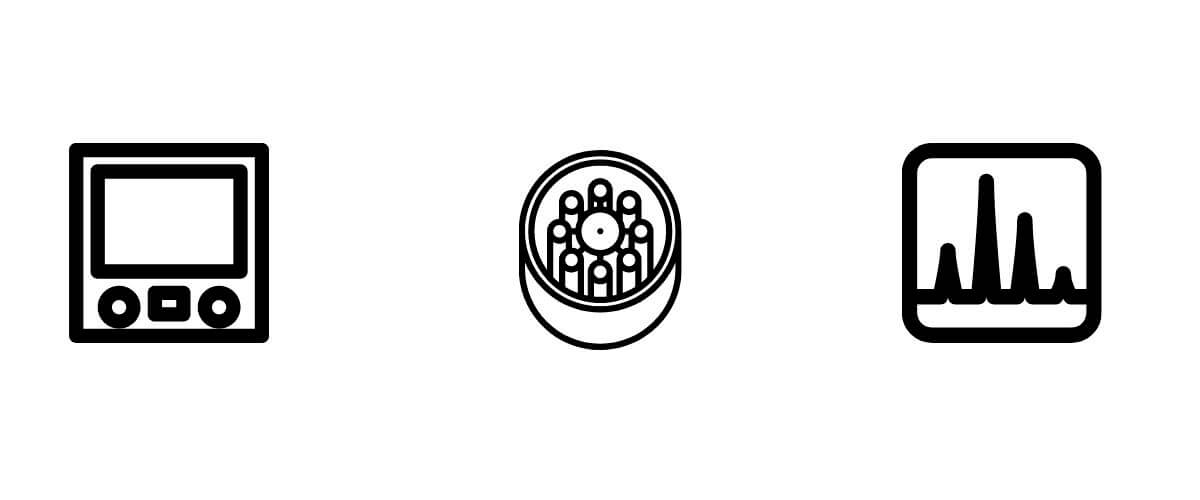
Whether you’re building a new medical laboratory from scratch, or if you’re renovating your existing lab space, medical labs need a great deal of specialized equipment. Each area of the lab requires unique equipment sets, as well as general laboratory furniture to support the lab’s testing activities.
While all labs have different equipment needs based on their scope and purpose, here is a general list of lab equipment and furnishings that all medical labs will need.
Autoclaves
Method of operation: Autoclaves produce pressurized steam to eradicate bacteria, fungi, and other pathogens.
Purpose: Autoclaves let you sterilize lab equipment, glassware, and other tools.
Blood Gas Analyzers
Method of operation: A blood gas analyzer measures the partial pressures of oxygen and carbon dioxide in the blood, as well as the blood’s pH.
Purpose: Blood gas analysis provides a precise measurement of the oxygen and carbon dioxide levels in the body. This allows doctors to determine lung and kidney function.
Cell Counter
Method of operation: Cell counters are used in medical labs for various reasons. They help perform medical diagnoses, cell therapy, and other types of research and are used anywhere cell types, particles, and even small organisms must be counted or sized.
Purpose: Cell counters can be used to count cells in blood or urine samples to determine the number and types of cells present, or to check the viability of a cultured cell line for research purposes.
Centrifuge
Method of operation: Centrifuges separate heterogeneous mixtures into their various components based on density. A centrifuge uses a motor to spin liquid samples at high speed.
Purpose: A centrifuge is needed for the removal of preservatives, experimental additives, and other substances.
Chromatography Equipment
Method of operation: Chromatography equipment is used to separate and purify the components of a mixture for later use. This equipment may be used for preparative or analytical techniques.
Purpose: Chromatography is used in a medical lab to extract biological fluids for rapid analysis. It can be used to diagnose and monitor numerous conditions, such as high blood pressure, Parkinson’s disease, vitamin levels, diabetes, and muscular dystrophy.
Cryostat
Method of operation: A cryostat maintains cryogenic temperatures for samples, slides, and devices stored within it by using extremely cold liquid chemicals, such as helium and nitrogen.
Purpose: Cryostats can provide quick diagnoses of tissue conditions, cancer margins, and selected tissue samples and chemical samples.
Cytology Equipment
Method of operation: Cytology equipment can include centrifuges, smear slides, and other equipment that allows medical lab technicians to study blood composition and analyze cellular conditions. This equipment can also be used for a urinalysis and other fluid sample analysis.
Purpose: Cytology equipment allows painless, noninvasive testing for numerous types of medical conditions, such as diabetes, cancer, vitamin deficiencies, and hormonal imbalances.
Gamma Counters
Method of operation: Gamma counters measure gamma radiation emitted by radionuclides, which may be used in various medical tests.
Purpose: Gamma counters are used to measure samples that have been identified using radioactive isotopes. They are important to nuclear medicine to measure hormone levels in the pituitary gland and the brain.
Histology Equipment
Method of operation: Histology equipment can include centrifuges, smear slides, microscopes, biopsy punches, and other equipment that allows medical lab technicians to study tissue samples.
Purpose: Histology equipment allows testing of tissue samples for cancers, abnormal growths, and diseases of the organs.
Hot Plates
Method of operation: A hot plate is a metal plate that heats various samples. They are considered much safer than traditional Bunsen burners because there is no open flame involved.
Purpose: Hot plates are used in medical labs as uniform heat sources.
Laminar Flow Hoods
Method of operation: Laminar flow hoods are used in a wide array of applications to keep airborne particles away from workspace and lab operators. They can be configured horizontally or vertically to accommodate different sizes of working equipment.
The air from a laminar flow hood goes back into the environment untreated so only non-hazardous materials should be handled in this type of work zone.
Purpose: Laminar flow cabinets provide airflow that helps keep the working environment free of contaminants. They prevent airborne contamination by providing uniform HEPA-filtered airflow across the work area.
Mass Spectrometer
Method of operation: Mass spectrometers sort and weigh ionized molecular fragments, a mass spectrometer can identify different molecular compounds based on their weight.
Purpose: Mass spectrometers are often used as diagnostic tools. Mass spectrometry is often used to analyze metabolites and proteins and is utilized as a diagnostic tool in clinical treatment.
It is used to diagnose metabolism deficiencies and is regularly employed for drug testing and discovery, as well as toxicology testing. Mass spec is also useful in determining whether enzymes or biomarkers are present in a person’s blood, plasma, or tissue.
Microplate Readers
Method of operation: Samples that are pipetted into the microplate reader wells produce, convert, or transmit light signals that are detected and quantified by the plate reader.
Purpose: Microplate readers are used to conduct a range of tests that can detect different biological, chemical, or physical signals in a sample.
Microscopes
Method of operation: Microscopes allow you to see cells and features of tissue samples that cannot be seen with the naked eye. Optical microscopes use light refraction or reflection to magnify an object positioned correctly under the lenses.
More advanced microscopes, such as electron microscopes, may or may not be necessary depending on the kind of testing done in your medical lab.
Purpose: Optical microscopes allow you to observe cells, thin sections of tissue, and many other microparticles in specimens. They are vital to understanding anything involving cells.
PCR System
Method of operation: Also known as a DNA amplifier, PCR systems amplify small segments of DNA or RNA.
Purpose: PCR systems are used to perform DNA fingerprinting, forensic analysis, and molecular cloning, as well as diagnosing genetic diseases and detecting pathogens such as Hepatitis B and C viruses.
Refrigerator and Freezer
Method of operation: Refrigerators are used for the local storage of samples and reagents. Freezers are used to store fragile samples, serum, and reagents.
Purpose: Refrigerators and freezers provide cold storage.
Casework and Storage Options
While the equipment listed above is necessary for medical labs to function, you also need to have the space to organize and store this equipment. You also must have the surfaces necessary for conducting tests and examinations.
Creating the right environment for medical tests requires sanitary, strong, and ergonomic casework and storage space in your lab.
For lab casework and storage, custom stainless steel lab furnishings are an excellent option. Since medical labs deal with pathogens and biohazardous tissue, you need to keep the lab space as sanitary as possible.
This can be accomplished more easily with custom furnishings made from an easily sanitized material like stainless steel
At OnePointe Solutions, we create fully welded metal cabinets that come in a multitude of options so that you can choose the casework that best meets your needs.
All of our metal cabinets and casework come with a powder coat finish and a five-year warranty, as well as soft-close hinges, door slides, and the option to customize.
Custom Medical Lab Benches, Tables, and Countertops
Every lab space has unique dimensions and surface needs. The best way to get the most out of your space is to have custom benches and tables.
That way, you don’t have to worry about equipment not fitting properly or about substandard bench functionality. Instead, you can rest assured that your benches will be able to do exactly what you need, 100% of the time.
Personalized accessories and countertop materials ensure that your lab will function just as needed. For medical labs, stainless steel is a good choice since it is easy to clean and resists contamination.
Epoxy resin is another quality choice for countertops, as it helps prevent corrosion and moisture buildup. It is also durable, heat resistant, long-lasting, and resists mold growth and other forms of contamination.
Phenolic resin countertops are a third option. These can help you meet laboratory requirements while staying cost-effective and providing resistance to chemicals, water, and wear and tear.
Both types of resin can be sanitized easily and will function perfectly for years.
Medical labs also require microscopy units. As with lab countertops and other lab furniture, having these made custom for your lab helps with lean design and workspace flow.
Custom microscope tables ensure that you have all of the optional features and options that you need to improve productivity in your medical lab. They also improve your storage space with numerous potential drawer configurations and help your lab’s function improve in versatility.
In addition, mass spec benches are great to have to house mass spectrometers as well.
Custom Lab Furniture
Your lab staff needs places to sit and work, and the furniture in your lab can make the difference between a good workflow and a poor, interrupted workflow. Ensure that your furniture fits your space perfectly with custom lab furniture.
Custom lab furniture can be made in your preferred color, dimensions, countertop and frame materials, and so much more. Reach out to us today for more information!
Need Help With Your Medical Lab?
If you have a medical lab and need custom casework and benches to meet the needs of your specialized floor plan, we can find you a solution that best benefits your needs. Call us at (866) 612-7312 to speak to a lab specialist today.


